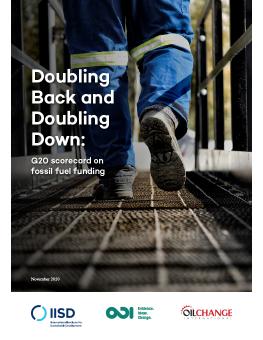
Doubling Back and Doubling Down: G20 scorecard on fossil fuel funding
This G20 scorecard report aims to track each of the G20 countries' progress in ending government support to fossil fuels. It has been prepared in order to increase transparency and accountability, as well as to highlight areas where more progress is needed so that G20 countries can meet their phase-out commitments and help accelerate the energy transition needed to meet our climate targets. It does so by reviewing progress in ending G20 funding to fossil fuel production and consumption between 2014 and 2019 and is complemented by an analysis of public money commitments for fossil fuel-intensive sectors in response to the COVID-19 crisis up to August 12, 2020.
-
G20 governments provided $584 billion annually (2017–2019 average) via direct budgetary transfers and tax expenditures, price support, public finance, and state-owned enterprise investment for the production and consumption of fossil fuels at home and abroad.
-
Governments provided more support to oil and gas production than any other stage of fossil fuel-related activity, at $277 billion (47% of the total support to fossil fuels).
-
Despite repeated pledges to end inefficient fossil fuel subsidies, G20 governments' support to fossil fuels has dropped by only 9% since 2014–2016: Progress made between 2014 and 2019 was insufficient and more needs to be done.
Despite various commitments since 2009 to end government support for fossil fuels and make “finance flows consistent with a pathway toward low greenhouse gas emissions and climate-resilient development” (Paris Agreement, Article 2.1c), G20 governments continued to provide significant support to fossil fuels in 2017–2019. G20 governments provided $584 billion annually (2017–2019 average) via direct budgetary transfers and tax expenditures, price support, public finance, and state-owned enterprise investment for the production and consumption of fossil fuels at home and abroad.
Additional downloads
You might also be interested in
Governments are subsidizing the destruction of nature even as they promise to protect it
When dignitaries from 196 countries converge in Montreal next week to rub shoulders and hash out a new global agreement to save nature, money will be on the agenda.
Five Key Priorities to End Fossil Fuel Subsidies in Canada
As the G7 president in 2025, Canada has a pivotal opportunity to lead by fully phasing out fossil fuel supports and investing in a cleaner, more equitable future. Here are five recommendations for effective subsidy reform.
Analysing India’s climate policy and the route post-COP27
As the world's third-largest greenhouse gas emitting country, India is often criticised by the international community. However, it justifies itself by stating its minuscule per capita emissions and low historical emissions as compared to the developed world. This analysis explores whether India is playing its role in tackling one of the world's most pressing issues.
State of the Sector: Critical energy transition minerals for India
This report presents a comprehensive strategy for securing a reliable supply of critical energy transition materials (CETMs) essential to India's clean energy and low-carbon technology initiatives.